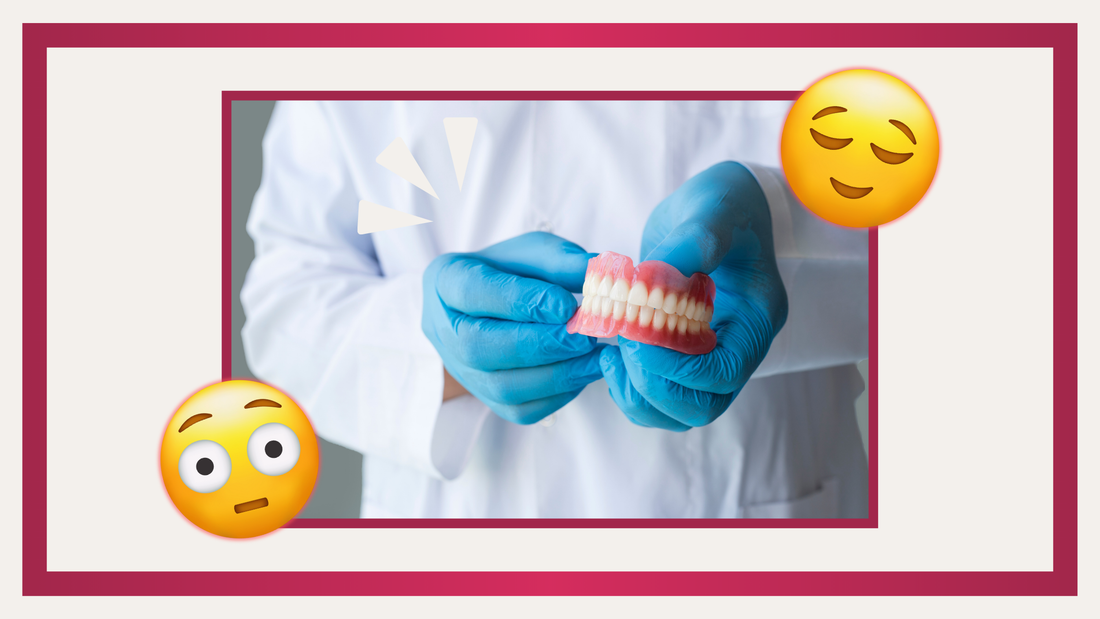
Get Ready for Your Big Day: Let Cushion Grip Help You Prepare for 'E-Day
Share
What is 'E-Day' and What Can You Expect on Your Big Day?
After a recent dentist visit, you learn it's time for full tooth extractions to prepare for dentures, leaving you feeling overwhelmed. As you research online, you come across the term "E-Day" (Extraction Day)—the day your teeth are removed for your new dentures.
At this point, you likely have serious dental issues like decay, infection, or pain. If prescribed antibiotics, it's crucial to complete the full course to address any infection before the extractions. Your dentist may have already provided a treatment plan, scheduling both the tooth extractions and the placement of immediate dentures.
The process typically starts with impressions of your teeth, which the dental lab uses to create your set of immediate dentures. Tooth extraction surgery is usually straightforward and can be done in one visit. Depending on your comfort level, your dentist will offer various anesthesia options, including oral sedation (a pill), nitrous oxide (laughing gas) to ease anxiety, or, in some cases, mild IV sedation or anesthesia.
How Do You Prepare For "E-Day"?
Before "E-Day," it's important to discuss time off with your employer. If you work in an office, plan for 3–5 days off, while a physically demanding job may require up to 10 days. Your dentist will provide specific recovery instructions before and after your procedure.
Here are a few things to prepare for your upcoming surgery:
- Fill all prescriptions ahead of time to ensure you have the necessary medications for pain management and recovery.
- Stock your kitchen with soft foods to ensure you have easy-to-eat options for recovery, such as soups, yogurt, mashed potatoes, and applesauce.
- Prepare several cold packs and freeze them in advance to help reduce swelling after surgery.
- Stock up on essentials like extra gauze, regular kitchen salt, alcohol-free mouthwash, a new extra-soft toothbrush, a denture brush, a denture cup, denture cleaning tablets or soaking solution, denture and mouth cleaning paste, and Cushion Grip Thermoplastic Denture Adhesive. These items will be crucial for your first day with immediate dentures and for adjusting to them.
-
Make sure you have someone available to drive you to and from your appointment, as you may be under sedation or feeling too unwell to drive yourself afterward.
Tips for Healing and Recovery After E-Day
The recovery time for multiple tooth extractions is similar to a single extraction, usually taking 7 to 10 days to heal enough for normal activities. However, if you have impacted teeth, like wisdom teeth, recovery may take 2 weeks or more.
Bruising and swelling are common, typically starting around day three post-surgery. To reduce swelling, use a cold pack or frozen vegetables. After extractions, immediate dentures will be placed, and it's essential to keep them in for the first 24 hours to stop bleeding and aid healing. On days 2 and 3, practice removing and reinserting them, rinsing your gums with warm salt water. Avoid leaving your dentures out for extended periods, as this can cause swelling and difficulty reinserting them.
Rest is crucial to allow blood clots to form in the tooth sockets, which are vital for healing. Dislodging these clots can lead to a painful dry socket. If you experience fever or severe pain after several days, contact your dentist.
Effective Strategies for Managing Pain After Tooth Extraction
Everyone handles pain differently, so pain management after tooth extractions differs depending on the individual. However, the most common pain management methods include:
- OTC pain medications like ibuprofen and naproxen reduce inflammation and alleviate pain, while Tylenol is also effective. Many people find alternating 800 mg of ibuprofen with 1000 mg of Tylenol works well after full mouth extractions. If needed, stronger pain meds, such as narcotics, can be prescribed by your dentist.
- Applying ice helps reduce pain by decreasing inflammation and numbing the area. Be sure to place a towel between the ice pack and your skin to protect it.
- Warm saltwater rinses are great for reducing pain and discomfort around the gums while promoting healing.
- Rest is crucial for managing pain, healing, and ensuring a smooth recovery process.
